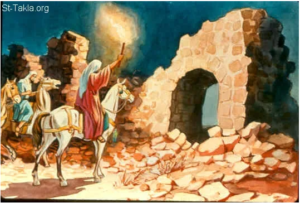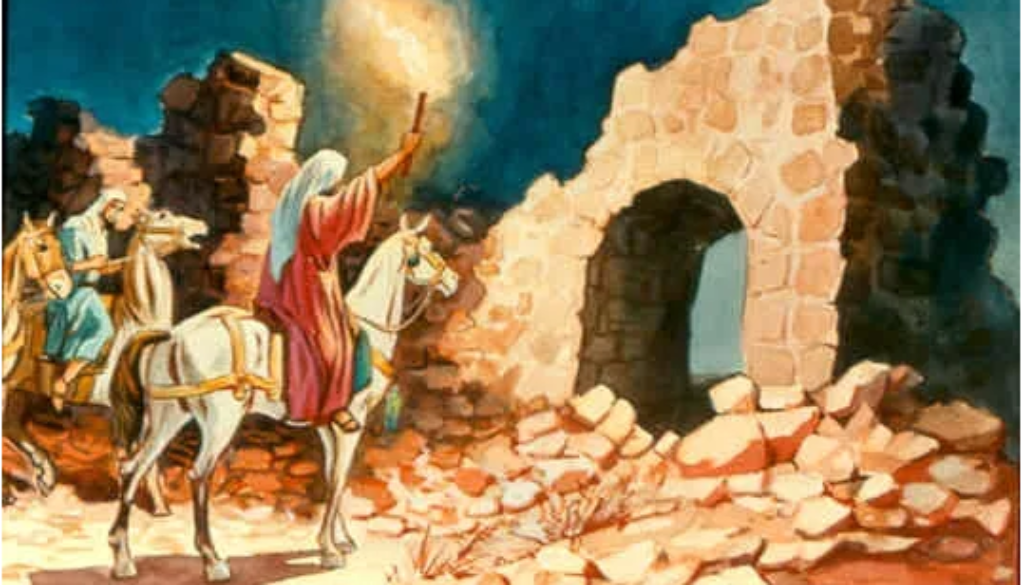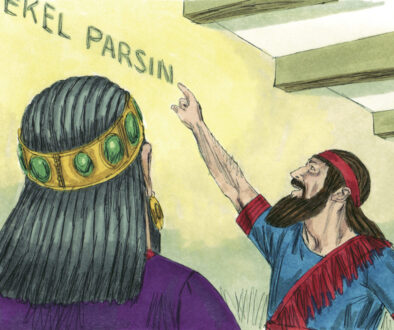Nehemiah 2:9-20 Inspection

Nehemiah comes to Jerusalem with one goal in mind. To rebuild the wall. He starts with an inspection of all that needs done BEFORE presenting his task to the people.
Nehemiah is faithful to discharge all his duties as they arrive. He starts with delivering the king’s letters to the neighbors. And they are NOT pleased with his mission. They will become a source of aggravation during the process of rebuilding.
Nehemiah also plays the whole thing low key when he gets to Jerusalem and doesn’t mention his mission right away. Funny thing is though that with all the guards who came with him the people must have known something was up. Only after doing a thorough inspection of the wall and the work that needed to be done did he reveal his reasons for coming. Let’s join him on his journey.
♥ ♦ ♥
Nehemiah knew he would be gone for many years so he packed everything he had that was portable. He would have to worry about replacing the non-portable things when he got to Jerusalem. He already knew the king would provide timbers for the house he would build for himself upon arrival. Surely the king would not begrudge him furniture too.
He looked around his room one last time. This has been his home for the last five years. The king had given Nehemiah quarters of his own after becoming his cup bearer. It was not the usual process of things but the king’s favor was upon Nehemiah. He would honor his promise to the king and one day return to these very walls.
Packing complete, Nehemiah heads to the courtyard. He will say his final farewell’s to his fellow servants before going into the city to purchase an animal to take him to Jerusalem. He hopes to also find a caravan going that way as a lone traveler is a prize no bandit can resist.
When Nehemiah reaches the courtyard he sees that it is occupied by a number of the king’s soldiers. Their packs are on their animals and they appear ready to make a long trip. He briefly wonders where they are bound but before he can ask the captain approaches him.
“Are you ready? Are these all your bags?”
Nehemiah is puzzled by the captain’s questions but answers them none the less. “I am. These are what I will be traveling with.”
“Good.” The captain signals to one of his men who comes over and collects Nehemiah’s belongings. He takes them to one of the camels and ties them on with the rest of the load. Nehemiah looks on in stunned silence.
“We need to get moving” says the captain. “You will ride here” he says as he indicates a camel in the middle of the pack.
Finally Nehemiah realizes that this is another gift of the king. He will not be traveling alone or with a caravan of unknown reputation but in the company of the king’s own soldiers. He sends another prayer heavenward. This one is full of thanksgiving.
The journey is long and often monotonous as they plod along in the desert from oasis to oasis. Nehemiah is following their progress on his map as best he can. He wonders if he could have made this journey on his own. “Probably not” is his considered opinion. He is grateful many times over for this gift of the king.
One thing that amazes him is the deference the soldiers provide him. He expected that he would simply be a traveler along for the ride but the men turn to him for purpose and some direction. As the band moved along and the first Sabbath of their journey neared, Nehemiah asked the captain about his plans.
“Will we be traveling every day or will there be days of rest?”
“It is not good to push too hard. We will need rest days along our journey.”
This answer pleased Nehemiah. He hoped he had enough favor in the eyes of the captain to make his next request.
“Are you aware of the Sabbath that the Jews keep each week?”
“I am.”
“May I request that this be one of the days of rest each week so that I may honor my God?”
“You had but to ask. It will be done.”
The soldiers seemed to enjoy the predictable time of rest. Occasionally it would mean pushing a little harder the day before so they could arrive at an oasis before the Sabbath started. The soldiers were not required to observe the same degree of ‘rest’ that Nehemiah did but they were always respectful of his observances and did not attempt to entice him into activities that would require he break his commitment to his God.
After months of travel, Nehemiah and company finally cross to the territory Beyond the River. Nehemiah is excited to finally begin the ‘official’ portion of his task. He and the king’s soldiers visit the principle rulers of each province they need to pass through before reaching the land of Judah. Nehemiah shows great respect to each ruler as he delivers the king’s letters. He is not haughty or proud in his demeanor towards them. But neither does he grovel before them. He knows he carries the full authority of Artaxerxes with him in his mission.
One leader, Sanballat the Horonite, bristled at Nehemiah’s presence. He clearly interpreted the king’s letters. He was NO friend to the Jews and was angry that the king was, once again, favorable towards them. His favorite servant, Tobiah the Ammonite, added fuel to his already smoldering fire.
“Before long the king is going to give even this territory back to the people of Israel. No place will be left for us.”
“I know this well. What do you propose I do about it” barked Sanballat.
“If you will allow me, I will keep watch on this Nehemiah and see if I can find any weaknesses we may use against him.”
“See to it that he DOES NOT rebuild that wall, by whatever means necessary. Within the king’s commands of course.” This last part he said with a sinister leer in his eyes.
Tobiah returned his look in kind as a signal of their agreement and understanding.
Nehemiah and company, unaware of the two men’s schemes, continued on their journey until they reached Jerusalem. The people didn’t know what to think of a group of soldiers arriving in their city. They wondered at their purpose. Was it for good or for evil? The thing that caused the most stir about their arrival was that Nehemiah was clearly one of the people of Israel, yet he seemed to command the soldiers who had come with him.
It was well known that many of the Jews had risen high within the courts of the kings during their captivity. Zerubbabel and Ezra were two of these men and they had found favor enough in the eyes of the kings to lead many of those who observed Nehemiah’s entrance to freedom. But Nehemiah didn’t come with another group of returnees. So what was he doing here?
Out of fear of the king, Nehemiah and his men were given the best accommodations in the city. Here they remained for three days without revealing their agenda. The elders and leaders made certain to honor them with fine meals, choice wine and good company as the time passed but none dared question their intentions.
Nehemiah has been waiting for a break in the activities. He is anxious to be about his tasks, the first of which is inspecting the current state of the wall. He doesn’t want to reveal his purpose until he has had a chance to assess the situation. It would not be good to proclaim he would do a task and then be unable to do so because he had not first counted the cost. On the third night he got his chance.
A lull in the activities came just after sundown, the start of the fourth day. The celebrations seemed to have run their course and the people’s obligation of hospitality had expired. Nehemiah was finally able to slip away in the night, from the house he was staying in, for a walk around the city.
As the city was large and Nehemiah had only a few hours of darkness in which to complete his task, he rode one of the horses that had served one of the soldiers on their journey. He and three of the soldiers who had made the journey made a second shorter journey. Their journey took them around the whole perimeter of the city.
They passed first to the Valley Gate to the Dragon Springs, then to the Dung Gate. Nehemiah took time to closely inspect the walls. To assess what was strong enough to rebuild upon and what would need to be completely torn down before reconstruction could begin. He then moved onto the Fountain Gate and the King’s Pool. The narrow passages here required him and his companions to proceed on foot. Nehemiah thought about the safety this must have provided the kings in the past as they faced assault by enemies. Anyone attempting entrance here had to do so one at a time and without a mount. It would have made for an easily defensible position.
After assessing the interior passages and gates, Nehemiah and his men rode out into the valley and inspected the wall from that vantage point. Finally they came back in through the Valley Gate on their way back to the place where they lodged.
Nehemiah was pleased with his ability to do this task without arousing suspicion but the fact that he went unchallenged was also of great concern. The ‘gates’ Nehemiah passed through were no more than gaping holes in a crumbling wall. No protection or defense was afforded by these structures that once held enemies at bay. Nehemiah’s ease of passing through the city undeterred emphasized the need of the task he had come to accomplish. The people were not safe within this city with the state of its walls and gates.
Morning came and Nehemiah summoned the officials, the elders and the leading priests. It was time he revealed his purpose. When all were assembled Nehemiah was ready to begin.
“Welcome. I know you are all wondering about my being here. I am concerned for the safety of our people. ‘You see the trouble we are in, how Jerusalem lies in ruins with its gates burned. Come, let us build the wall of Jerusalem, that way we no longer suffer derision’ (verse 17).”
“And how are we to do this? We haven’t the supplies nor are those who control them willing to let us purchase them at a fair price.”
“While I served as the king’s cup bearer I heard of the plight of my people here in the land. After much prayer the Lord our God presented me with an opportunity to bring the matter of my brothers to his attention. The hand of the Lord was surely upon me as I shared my concern as well as asked for provisions from the king. He placed in my hand letters to the governors of the provinces that surround us that they let me pass through in peace until I came to you here in Judah. He also gave me ‘a letter to Asaph, the keeper of the king’s forest, that he may give me timber to make beams for the gates of the fortress of the Temple, for the wall of the city and for a house that I shall occupy’ (verse 8a). Because of the Lord’s favor and the king’s provision we will be able to build again the walls of Jerusalem, the city our God chose for His name forever.”
All the assembly was excited by my news. “Let us rise up and build” (verse 18b) rang out from every corner of the room.
Plans were laid out that very day as to which clans would be responsible for which portion of the wall. Tasks were also prioritized as to what needed to be done first and what could wait. Clearing the remaining rubble, chopping trees, and turning the trees into usable beams were the first order of business. These jobs would commence the following morning.
It didn’t take long for men to come pouring in from all areas of Judah to join in the work. Things began progressing quickly as Nehemiah organized the work crews. All the Jews were excited to see their city of their God being restored.
There were three who were not of Israel who were very distressed by what they saw. Sanballat and Tobiah had gathered a third to their opposing company; Geshem the Arab. When these men heard of the progress of the Jews they decided to do whatever they could to stop in. Their first means of ‘attack’ was to verbally taunt and jeer at those working on the wall.
“You haven’t the strength needed to do this. Why don’t you give up? There isn’t a skilled builder among you. How do you expect to make anything that can stand? What is this thing you are doing anyway? Are you trying to rebel against the king?”
Nehemiah stood between those working on the wall and their abusers. He did NOT let them go unchallenged.
“The God of heaven will make us prosper, and we His servants will arise and build, but you have NO portion or right or claim in Jerusalem” (verse 20, emphasis added).
This would not be the last taunts the people rebuilding the wall heard from the mouths of these men. Nor would it be the last time Nehemiah and God defended them.
(to be continued)
♥ ♦ ♥
Nehemiah counted the cost before jumping in and getting everyone excited. He did the groundwork. He also stood against those who tried to discourage them. Nehemiah put his faith in God to get this done. He trusted God to look out for the people. Later we will see that he also prepared them for the fight if that’s what it took to see this task through.
Father God, help me count the cost and stick with the tasks You have called me to do. Counting the cost for Nehemiah didn’t mean making a choice between going ahead or abandoning the task. It meant being aware of what would be needed to do the task You called him to. That is how I feel about this task You have called me to. There are a lot more ‘costs’ than I knew about in the beginning but You provide what is needed when each new task rises to the surface. I trust You to use what You birthed in me EXACTLY how You want to. No 52 days here. I wonder if 12 years will be more like it. Whatever You decide Lord is what I will do because I choose to follow wherever YOU lead.



